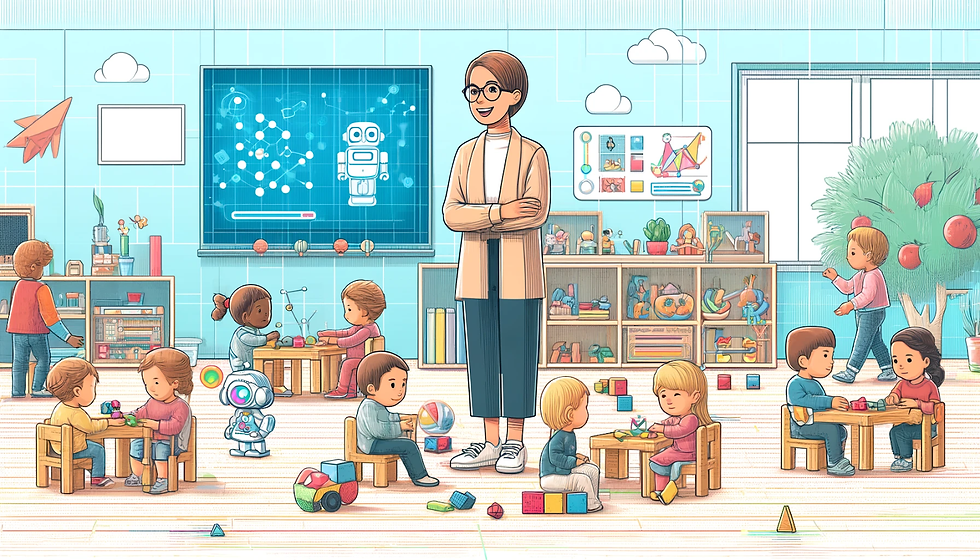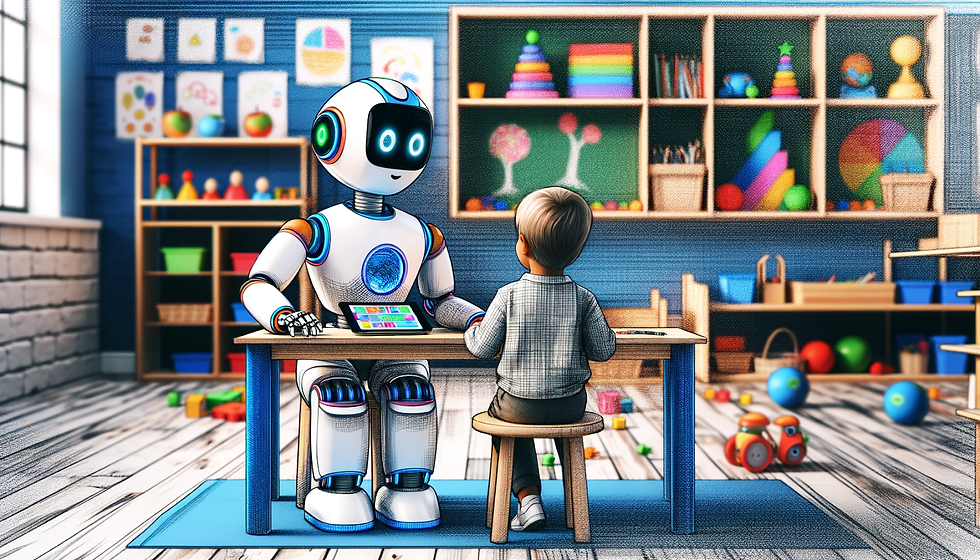Personalized Learning Meets AI: The Next Generation of Education
- Justin Press

- Apr 15, 2024
- 4 min read
Updated: May 22, 2024
In a world where technology is advancing at an unprecedented pace, education is inevitably on the brink of a revolution. Artificial intelligence is transforming various industries, and its impact on the education sector is no exception. By enabling individualized learning experiences, AI has the potential to reshape the way we teach and learn, ultimately preparing students for the careers of the future.
This article explores how AI-powered personalized learning, combined with modern Montessori approaches, can foster the development of critical skills and adaptability needed in the rapidly evolving job market. We'll examine real-world examples of schools and companies adopting these innovative teaching methods and discuss the implications for STEM education, AI literacy, and lifelong learning.
Key Takeaways:
AI-powered learning and modern Montessori approaches revolutionize education by tailoring instruction to each student's needs.
AI enhanced education fosters 21st-century skills, STEM knowledge, and lifelong learning, crucial for thriving in future careers.
Collaboration is key in order to integrate AI into education.
The Modern Montessori Approach
AI-powered personalized learning and modern Montessori approaches are revolutionizing education, enabling students to learn at their own pace and style, ultimately fostering a lifelong love for learning.
Personalized learning, facilitated by AI, is transforming the educational landscape by tailoring instruction to each student's unique needs, abilities, and interests. This approach recognizes that every child learns differently and at their own speed. By leveraging adaptive learning platforms like Knewton and DreamBox Learning, along with intelligent tutoring systems such as Carnegie Learning's MATHia and Duolingo, educators can provide students with targeted support and resources that optimize their learning experience.
The benefits of AI-powered personalized learning are clear: students receive instruction that adapts to their level of understanding, ensuring they master concepts before moving on to more challenging material. This approach not only improves academic performance but also boosts student engagement and motivation. As a result, a growing number of schools and universities are embracing these technologies. Arizona State University's Adaptive Learning Initiative and Rocketship Public Schools' use of DreamBox Learning are just two examples of how AI is reshaping education.
Alongside AI-powered personalized learning, the modern Montessori approach is experiencing a resurgence. Montessori education, developed by Italian physician and educator Maria Montessori, emphasizes hands-on, self-directed learning in a carefully prepared environment. This method fosters independence, creativity, and a deep love for learning. AI can complement the Montessori approach by providing students with interactive, self-paced learning materials that align with Montessori principles.
AI-powered learning materials and manipulatives, such as Marbotic Smart Numbers and Osmo, offer a digital twist on traditional Montessori tools, engaging students through interactive play. Similarly, Montessori-inspired digital platforms like Montessorium and Edoki Academy provide a wealth of learning activities that encourage exploration and discovery. By integrating AI and technology into the Montessori classroom, educators can create a dynamic learning environment that adapts to each child's unique needs and interests.
Innovative Montessori schools, such as Wildflower Schools and The Montessori School of Silicon Valley, are already embracing AI and technology in their classrooms. These schools use personalized learning software and tech-enhanced environments to create a seamless blend of traditional Montessori methods and cutting-edge technology. As more schools recognize the potential of this powerful combination, we can expect to see a growing number of AI-enhanced Montessori classrooms in the future.
The synergy between AI-powered personalized learning and modern Montessori approaches holds immense potential for transforming education. By harnessing these innovative methods, we can create learning environments that nurture each student's unique potential, foster a lifelong love for learning, and prepare them for success in an AI-driven world.
Importance of Lifelong Learning
As AI reshapes the job market, the skills and knowledge students acquire through AI-powered education will be crucial for thriving in the careers of the future.
The rapid advancement of AI is transforming the professional landscape, creating new roles and industries while rendering others obsolete. To succeed in this dynamic environment, students must develop a diverse set of skills that enable them to adapt and innovate. AI-powered personalized learning is uniquely suited to help students cultivate these essential 21st-century skills, such as creativity, critical thinking, collaboration, and problem-solving.
By tailoring education to each student's strengths, weaknesses, and learning style, AI-driven tools can help learners develop a growth mindset and foster resilience in the face of challenges. Personalized learning platforms can provide students with targeted feedback and recommendations, encouraging them to take ownership of their learning journey and develop the self-directed learning skills that will serve them well in their future careers.
Moreover, as AI becomes increasingly prevalent across industries, it is crucial for students to develop a deep understanding of AI and its applications. STEM education, particularly in fields like computer science and data analysis, will be essential for preparing students to work alongside AI systems and harness their potential. Initiatives such as AI4K12 and AI4All are working to promote AI literacy and ensure that students from diverse backgrounds have access to these critical skills.
In addition to formal education, the rise of AI is driving a growing demand for continuous learning and upskilling. As the job market evolves, professionals will need to regularly update their skills to remain competitive. AI-powered education can play a vital role in this process, providing personalized learning paths and recommendations based on an individual's career goals and learning preferences.
Platforms like Coursera and Udacity offer a wide range of AI-related courses and certifications, enabling professionals to acquire the knowledge and skills they need to succeed in the AI-driven job market. Similarly, continuous learning platforms such as LinkedIn Learning and Degreed leverage AI to curate personalized learning experiences, helping users stay up-to-date with the latest industry trends and in-demand skills.
As we look to the future, it is clear that AI will continue to shape the education and career landscapes. By embracing AI-powered education and prioritizing the development of 21st-century skills, STEM knowledge, and a commitment to lifelong learning, we can empower students and professionals alike to thrive in the age of AI.
Investing in AI-powered education is not just about preparing students for the jobs of tomorrow; it's about fostering a culture of continuous learning and adaptability that will enable individuals to navigate the ever-changing world of work successfully.
Closing Thoughts
The future of education and work is being reshaped by AI, and we must adapt to stay ahead.
By embracing AI-powered personalized learning and modern Montessori approaches, we can equip students with the skills and mindset needed to thrive in an AI-driven world.
Collaboration among educators, policymakers, and industry leaders is crucial to ensure widespread access to these transformative technologies and foster a culture of lifelong learning.





